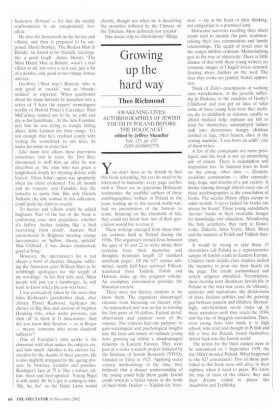Growing up the hard way
Theo Richmond
AWAKENING LIVES: AUTOBIOGRAPHIES OF JEWISH YOUTH IN POLAND BEFORE THE HOLOCAUST edited by Jeffrey Shandler Yale. 125, pp. 437, ISBN 00300092776 You don't have to be Jewish to find this book rewarding, but you do need to be interested in humanity: every page seethes with it. There are no gruesome Holocaust testimonies: the youthful authors of these autobiographies, written in Poland in the years leading up to the second world war, had no premonition of the horrors to come. Standing on the threshold of life, they could not know how few of their generation would live to cross it.
These writings emerged from three literary contests held in Poland during the 1930s. The organisers invited Jews between the ages of 16 and 22 to write about their everyday lives, their memories and thoughts; minimum length '25 standard notebook pages'. Of the 627 entries submitted, nearly half have survived. Fifteen, translated from Yiddish, Polish and Hebrew, make up this poignant volume. An exemplary introduction provides the historical context.
These were not literary contests as we know them. The organisers discouraged entrants from focussing on literary style. An unpractised pen' was no bar to winning the first prize of 30 dollars. Factual detail, observation and candour were of the essence. The contests had one purpose: to gain sociological and psychological insights into the lives and minds of ordinary young Jews growing up within a disadvantaged minority in Eastern Europe. They were part of a wider research project initiated by the Institute of Jewish Research (YIVO), founded in Vilna in 1925. Applying social science methodology of the time, they believed that a deeper understanding of the young could help them guide Jewish youth towards a better future in the lands of their birth. Doikevt — Yiddish for 'here
ness' — lay at the heart of their thinking, not emigration to a promised land.
Holocaust survivors recalling their shtetl youth tend to idealise the past, sentimentalising their lost communities and family relationships. The death of loved ones in the camps inhibits criticism. Memorialising gets in the way of objectivity. There is little chance of that with these young writers; no romantic images of Chagall lovers serenely floating above fiddlers on the roof. The lives they evoke are painful, brutal, oppressive.
Think of Zola's descriptions of working class wretchedness, or the juvenile suffering in Dickens, or the cruelties of Gorky's Childhood and you get an idea of what some of these young lives were like: mothers die in childbirth or sickness, unable to afford medical help; orphans are left to fend for themselves; unemployed fathers sink into destitution; hungry children clothed in rags, often beaten, slave at the sewing machine. I was born an adult., one of them writes.
A few of the contestants are more privileged, and the book is not an unremitting tale of misery. There is redemption and inspiration too. As Judaism loses its hold on the young, other isms — Zionism, socialism, communism — offer comradeship, hope, and dreams of a just society. A theme runnng through almost every one of these autobiographies is the consolation of books. The secular library offers escape to other worlds: 'I never lacked for hooks but always for bread.' These young autodidacts 'devour' books in their insatiable hunger for knowledge and education. Abandoning the holy scriptures, they turn to Dostoevsky. Diderot, Jules Verne, Marx, Herzl and the masters of Polish and Yiddish literature.
It would be wrong to take these 15 chroniclers (all Polish) as a representative sample of Jewish youth in Eastern Europe. Children from middle-class families lacked the incentive to pour out their hearts on the page. The totally assimmilated and strictly religious abstained. Nevertheless, these riveting texts illuminate Jewish life in Poland in the inter-war years, its vibrancy, anxieties and aspirations, the divisiveness of class, factious politics and the growing gap between parents and children. Interestingly, anti-Semitism rarely crops up in these narratives until they reach the 1930s and the rise of thuggish nationalism. Then, even young Jews who made it to high school, who read and thought in Polish and felt a love for Poland, found themselves driven back into the Jewish world.
The prizes for the third contest were to be announced on 1 September 1939, the day Hitler invaded Poland. What happened to the 627 contestants? Two of those published in this book were still alive, in their eighties, when it went to press. We know the fate of most of the others: they and their dreams ended in places like Auschwitz and Treblinka.


























































































 Previous page
Previous page